From Roger Rabbit to Rescue Rangers: The Legacy of Mega Crossover Movies
Where does Chip n' Dale: Rescue Rangers fit in the grand history of...IP party? Mega crossover? Franchise collective? Property festival? We don't even know what to call these kinds of movies!
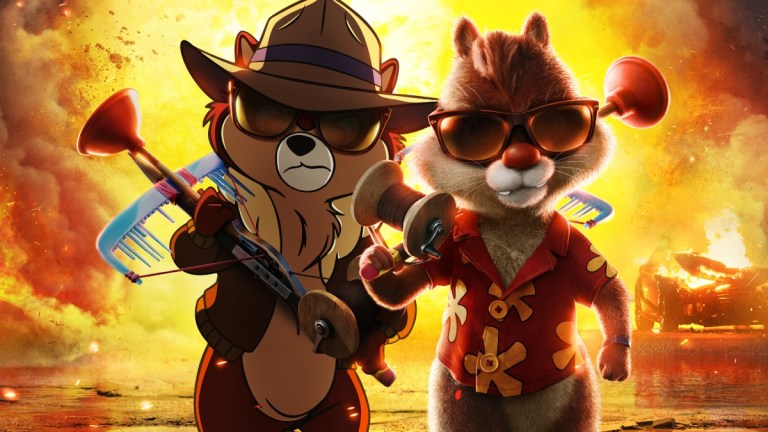
This article contains spoilers for…a whole lotta stuff.
Chip ‘n Dale: Rescue Rangers just arrived on Disney+ and while it follows up on 1988’s Rescue Rangers animated series, it’s more of a thematic sequel to Who Framed Roger Rabbit?. Both feature similar concepts like a world where humans and cartoons coexist, each use the existence of cartoons to explain real life issues (racism, trafficking), and both have a freaky hybrid villain in the finale. But the main thing everyone sees is that they’re also gigantic collections of cartoon cameos. Even crazier, the cartoons come from different owners.
I’m not sure what the correct term is for the Roger Rabbit subgenre. An IP party? A mega crossover? A franchise collective? Property festival? Whatever it is, we’ve seen it gradually evolve in-between Who Framed Roger Rabbit? and Chip ‘n Dale: Rescue Rangers.
Even in the world of video games, it’s become a regular appearance. The Poker Night at the Inventory games had GlaDOS explaining how Ash Williams from Army of Darkness is Brock Samson’s ancestor via time travel. Lego Dimensions was a gigantic melting pot of major properties. Not only do we have the modern iterations of Super Smash Bros. with its many guest characters, but we have all the knockoffs, such as Smash Bros. but Playstation, Smash Bros. but Nickelodeon, and Smash Bros. but Cartoon Network.
Let’s take a look at the history of these IP party movies and what makes them tick, what worked, and what didn’t. Certain movies won’t be making the list for one reason or another. The properties involved, at least some of them, should be trademarked and not just public domain (i.e. Shrek and League of Extraordinary Gentlemen). Even if there is one umbrella company in the crossover, there should at least be diverse properties, so I’m not counting Teen Titans Go to the Movies, no matter how obscure the Challengers of the Unknown are.
Also, The Emoji Movie is more about product placement than actual character crossover. I’m not covering that one. There’s a movie on the list that’s even worse and I still can’t be bothered to talk about The Emoji Movie.
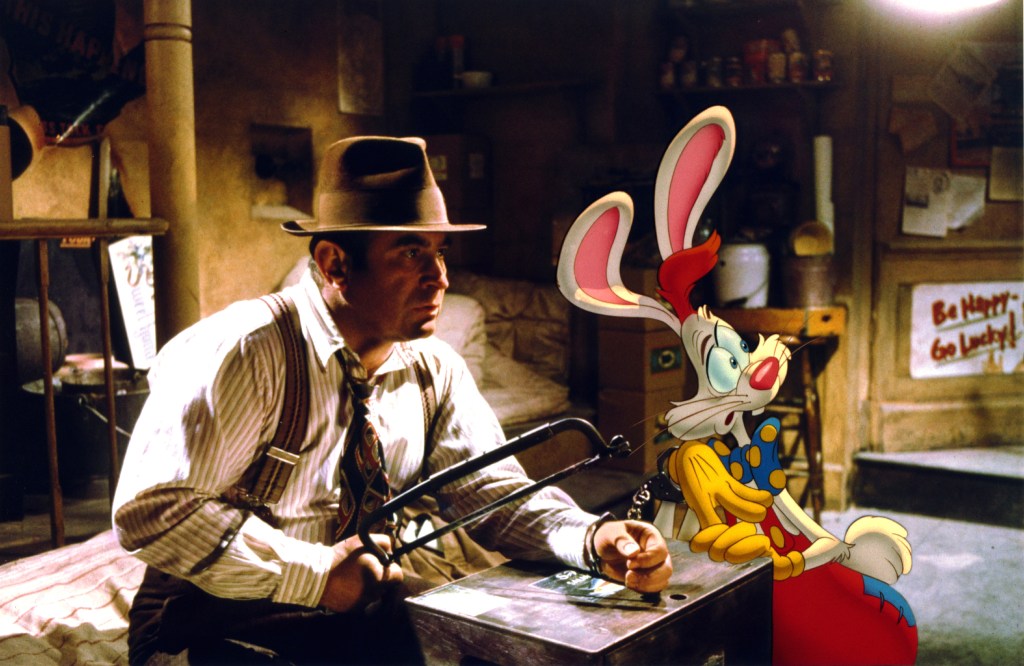
Who Framed Roger Rabbit? (1988)
The Robert Zemeckis classic gave us a world where Disney characters live alongside Looney Tunes, as well as the likes of Betty Boop and Woody Woodpecker, and while that was a huge deal when it came out, it wasn’t the most important novelty about the movie itself. What made the movie so special was the special effects of how the titular Roger Rabbit would interact with the physical world. The way actors and inanimate objects interact with a character who isn’t even there still holds up as incredibly impressive.
At the core are the characters of this detective story, namely the disgruntled Eddie Valiant (Bob Hoskins), who has to put up with Roger’s zaniness while working to clear his name. The movie holds back on the existence of Toon Town so that by the time Eddie gets serious and readies himself for the third act, he also goes full-on into the cartoon reality.
Meanwhile Christopher Lloyd does an insanely great job as Judge Doom, giving my generation nightmares with his sinister cartoon eyes and accompanying voice.
Best IP Crossover Moment: Seeing Daffy Duck vs. Donald Duck in a piano duel justifies this movie on its own. It’s such a wonderful moment. Both exist as jealous second bananas with anger issues, so putting them in a scene together is like the irresistible force vs. another irresistible force.
Conversely, the scene of Bugs Bunny and Mickey Mouse just makes me wonder why Mickey’s being such a dick.
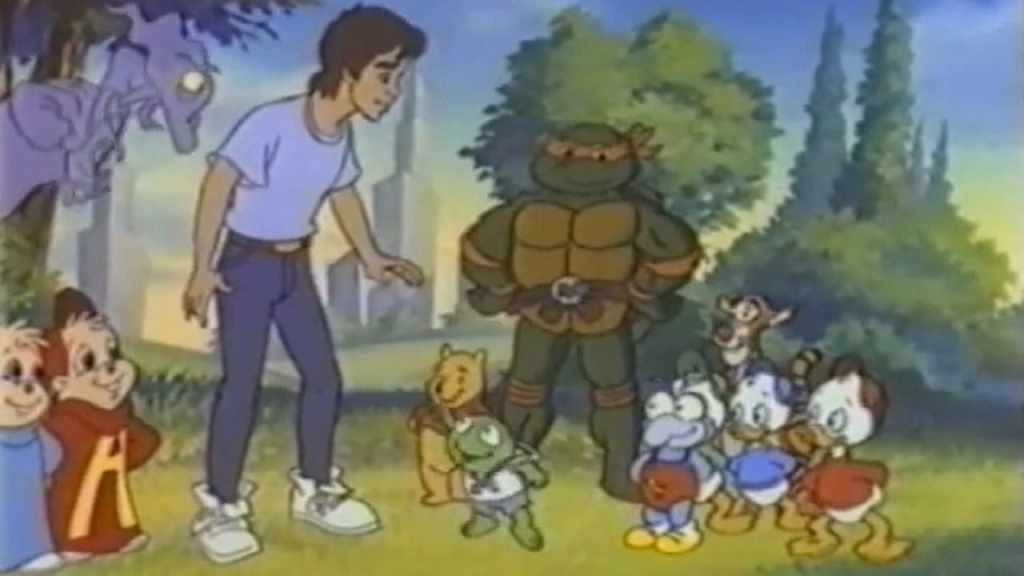
Cartoon All-Stars to the Rescue (1990)
Not quite a movie, but unique enough that I feel the need to discuss it, Cartoon All-Stars to the Rescue was a joint effort (heh) between different TV networks to put all their cartoon characters together in order to do a PSA against drug use. Featuring the likes of Alf, Bugs Bunny, Daffy Duck, Pooh, Tigger, Slimer, Alvin and the Chipmunks, the Muppet Babies, Donald’s nephews, the Smurfs, Garfield, and Michelangelo (none of the other Turtles, just Mikey), the various characters join together to help a little girl get her big brother off of drugs. All the while, George C. Scott plays the role of a living cloud of marijuana smoke.
What I find kind of funny is how most of the characters are introduced via the Toy Story way in the very beginning. They all start off as toys, posters, and branded appliances who come to life. Then when other characters show up, they just show up. Bugs Bunny and Michelangelo just exist. Don’t question it.
Though the villain is fun (Scott’s Smoke comes off as a prototype for James Woods’ Hades), the whole cartoon crossover is the only other thing keeping this special afloat. When you get a scene of the little sister being too afraid to tell her father about her brother’s drug use, you’ll be begging for another Chipmunks musical number.
Best IP Crossover Moment: Seeing the Netflix series, Saturday Morning All Star Hits culminate in their mega-crossover spoof All Cartoon Stars Say Don’t Say Shut Up. After the show spends several episodes introducing all sorts of early ‘90s cartoon parodies (making fun of everything from Denver the Last Dinosaur to Pro-Stars), all the various characters band together to warn about the dangers of saying, “Shut up!” to people in an incredibly on-point parody of Cartoon All-Stars to the Rescue.
What I’m trying to say is that more people need to check out Saturday Morning All Star Hits.
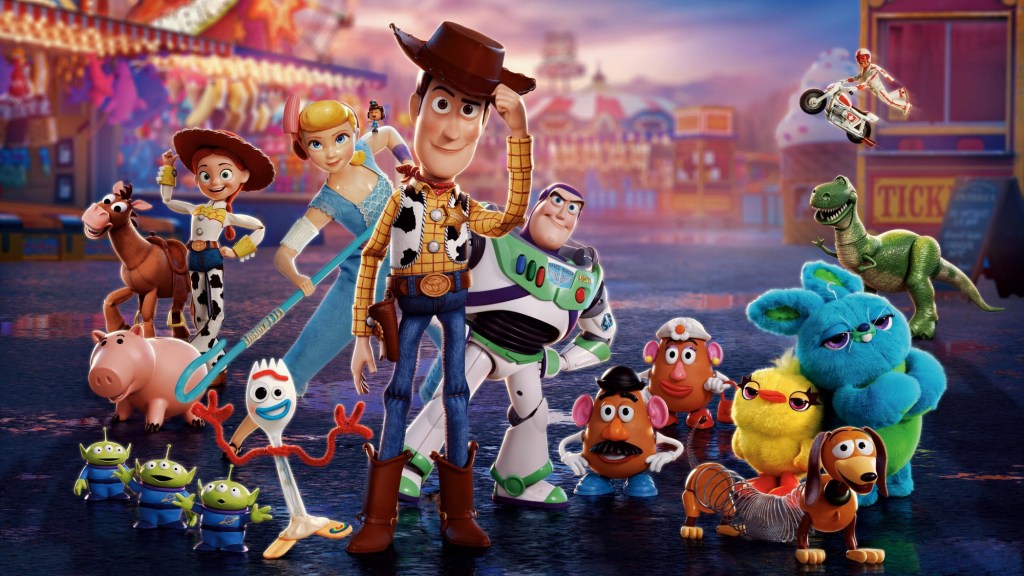
Toy Story Series (1996)
It’s borderline, but I’m going to count it. This inexplicable world of toys who come to life when nobody’s around is mostly made up of new properties, but every now and then, some pre-existing classic will pop up to give the aesthetic some authenticity. Mr. Potato Head, Mrs. Potato Head, and the Army Men are the most notable ones in the first movie, but a lot can be said about Barbie and Ken’s relationship and story arc in the third installment.
It’s nothing that’s especially necessary, but it does add some legitimacy to this reality. These are properties that have only had personality within the child’s imagination, so tossing in celebrity voices like R. Lee Ermey or Don Rickles allows these guys to have their own Disney identity.
While straying from the movies for a second, Toy Story’s tendency to mesh with real toys and games gives us the line queue from Toy Story Midway Mania at the Disney parks and those rooms are just a world of nostalgic beauty. If you haven’t seen it before, imagine being the size of a toy and having board game boxes tower over you as you walk through a labyrinth of giant dice, Uno cards, checker stacks, and Crayola crayons.
Best IP Crossover Moment: Fisher-Price’s Chatter Telephone toy has always given me the creeps and the way they included it in Toy Story 3 fully revealed how unnerving those things can really be.

FoodFight! (2012)
Now we get to the movie that’s so utterly and surreally bad that the story behind the making of it is more entertaining than the movie itself. Originally slated for 2002, FoodFight! was intended to be Toy Story but taking place in a supermarket. Instead of toys coming to life, it would be grocery mascots. Characters like Mrs. Butterworth, the California Raisins, Twinkie the Kid, Mr. Clean, and so on. If a company didn’t want to play ball and throw in a certain mascot, the creators would dump on them via parody characters.
Oh, General Mills doesn’t want the movie to include Count Chocula? Well, maybe they’ll feel silly when Larry Miller voices Vlad Chocool! And yeah, despite the movie’s quality, they had a ton of notable actors involved lending their voices, from Charlie Sheen to Hillary Duff to Ed Asner.
Unfortunately, the hard drives with all the original animation were stolen and the studio was back to square one. They cut corners with horrific-looking motion capture animation and after the movie bounced from owner to owner, it was pushed out the door as cheaply as possible. What we got was a lame cross between Toy Story and Casablanca featuring a bunch of notable characters that nobody actually cares about.
Well, nobody except Mr. Clean. Housewives around the world are thirsty for the enigmatic bald muscleman.
On a nicer side note, the movie seemingly pays homage to its Who Framed Roger Rabbit? roots by having Christopher Lloyd play another freaky human disguise meant to push the villain’s evil agenda.
Best IP Crossover Moment: Even though Chester Cheetah isn’t in the final film, he shows up in an early trailer. Using the original animation style, he’s riding off on a motorcycle with kind of a Tex Avery swagger to him. For a brief moment, I can feel the potential that was lost in this doomed project.

Wreck-It Ralph Series (2012)
Off we go to the world of video games, centered around a Donkey Kong pastiche suffering from crippling depression. There are plenty of video game character cameos, but none of them are all that important. They add to the ill-explained arcade world with their sight gags and familiarity, but they’re more background characters than a supporting cast, outside of the Bad Anon members and the Q*Bert crew.
Even with all those Bad Anon cameos, not a single one of them holds a candle to that douchebag Gene. Gene is the worst non-grandma character in modern Disney, and it frustrates me that he never got what’s coming to him.
Anyway, the sequel went in a different direction with its half-baked internet gimmick and felt incredibly disjointed. Then again, we at least got the ever-so-memorable bit of all the Disney princesses hanging out with each other. It felt barely attached to the rest of the movie, but it was still nice.
Best IP Crossover Moment: The villain support group is such a great scene, partially due to them having M. Bison’s in-game English voice actor Gerald C. Rivers involved. I’m still annoyed that Zangief is considered a villain, no matter how inspiring his advice is. The Red Cyclone is a hero to children all over the world and is one of few Street Fighter characters with the willpower to hang out with Rufus for more than a few minutes at a time.

Lego Movie Series (2014)
It’s a movie where Nick Offerman plays a pirate cyborg mech. What’s not to love?
The Lego Movie not only looks beautiful and has some great jokes and heart to it, but the first one has a lot of fun with the many different properties represented by the plastic figures. The Justice League, Gandalf, Dumbledore, Michelangelo, Milhouse, Shaq, and so on add a lot to the diverse nature of Lego designs, but it also helps out the story in the long run. Not only does it make generic nobody Emmett (voiced by Chris Pratt) seem like a bigger deal during his story of self-discovery, but they tie into the “true reality” of what’s happening in the movie and where the real drama lies.
According to the big, mean dad played by Will Ferrell (who seemed to literally phone it in for the sequel), these characters and their worlds should not be meshing together. Such creativity goes against the purity of Legos and the displays they’re supposed to be made for! Stupid kids and their stupid imaginations!
By the time the sequel comes around, the Master Builders are scaled back by a mile, and we barely get any notable cameos. Instead, we get more Chris Pratt, so…yeah.
The Lego Batman Movie is also worth a mention due to the way it begins with a massive team-up of practically every Batman villain ever. From there, it can only step it up a notch by having Batman and friends take on all sorts of non-DC threats like King Kong, Voldemort, and the Eye of Sauron.
Best IP Crossover Moment: Emmett’s big plan in the first movie revolves around the inclusion of Batman being Bruce Wayne, which is followed by Batman both acting like he has never heard of such a person while at the same time admitting that this Bruce Wayne sounds like a totally awesome dude.
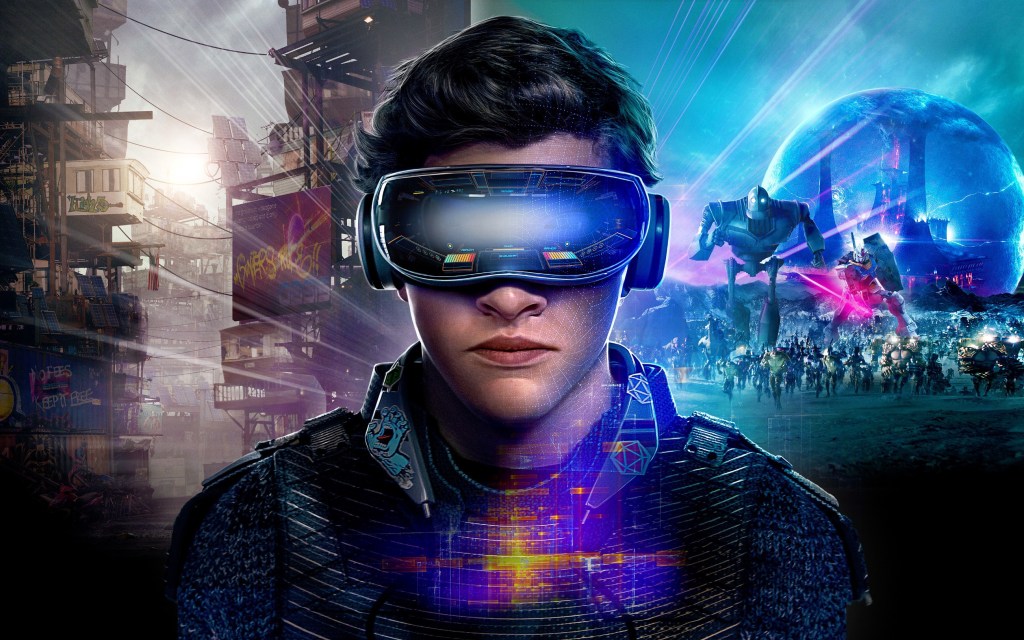
Ready Player One (2018)
Based on the book by Ernest Cline, Ready Player One is about a dystopian future where everyone is way into the VR internet. Since people can look however they want in cyberspace, the movie is littered with all sorts of pop culture references. People can make themselves look like Jason Voorhees, Tracer, Battletoads, and so on. There are licensed avatars from here to the horizon, but unfortunately the lighting is so muddy in a lot of the scenes that you can barely tell who is supposed to be who.
One great thing for me is that they included both Ryu and Goro, meaning that we FINALLY get an official Street Fighter/Mortal Kombat crossover! Too bad they couldn’t bring in any Marvel characters to rub elbows with the DC guys. It’s been too long.
The movie itself is rather mediocre and the third act seems to stretch on forever. At least they use the IP gimmick to build toward an explosive finale where characters from all walks of copyright rally together to prevent THE MAN from winning a video game contest and harshening their buzz. And as the Iron Giant fights Mecha-Godzilla, you wonder how it’s the 2040s and mankind has somehow ceased to create new and interesting pop culture concepts for at least several decades.
Best IP Crossover Moment: Putting down a few bucks to buy the RiffTrax commentary for Ready Player One. Hearing the MST3K guys comedically trash the movie makes the two and a half hours fly by.
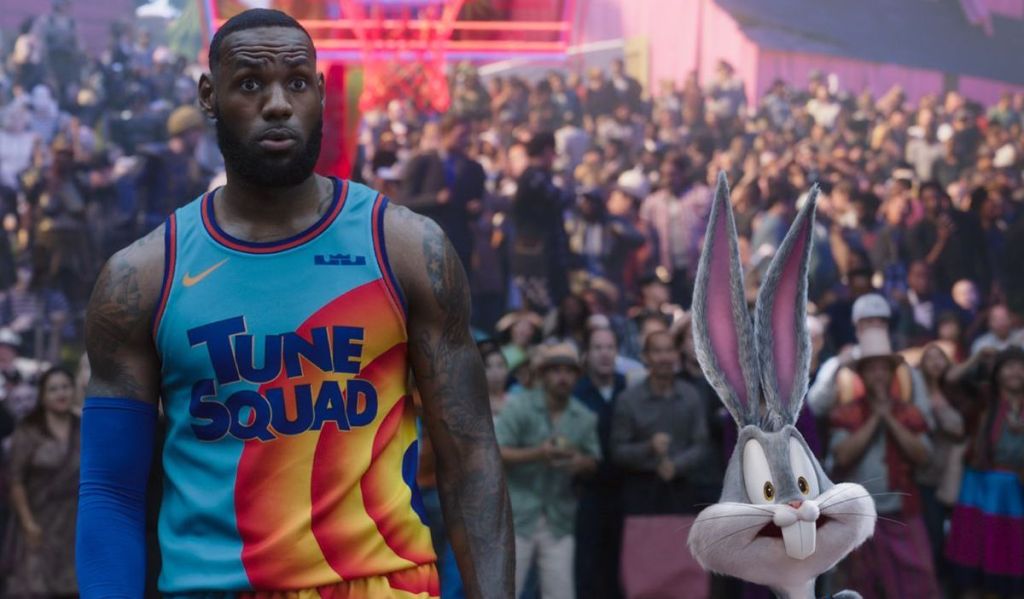
Space Jam: A New Legacy (2021)
The first Space Jam was about the Looney Tunes playing basketball, a dated website that refused to die, and a theme song that goes with everything. The sequel decided to dive into everything owned by Warner Bros. in two ways. First, it’s revealed the Looney Tunes have gone off to do crossovers with various Warner properties, giving us Elmer Fudd as Dr. Evil, Roadrunner zooming across the Fury Road, and the reveal that Rick and Morty had been stuck dealing with Taz. Second, a whole bunch of Warners characters act as extras for the big basketball game in the end.
Yes, that is the Mask in the background, watching Wile E. Coyote hit a three-pointer. Does it mean anything? Not at all. Hey, look! The Herculoids! They are also watching Lebron James show more enthusiasm than Michael Jordan could ever muster!
At the end of the day, Space Jam 2 was just the result of a game of chicken that movie producers and fans have been playing for years as the internet continued to keep daring the movie to exist. It happened and now we can all move on with our lives.
Best IP Crossover Moment: Al G. Rhythm referencing Training Day by claiming, “King Kong’s got nothing on me,” only to see the actual King Kong in the background, harumphing over it.
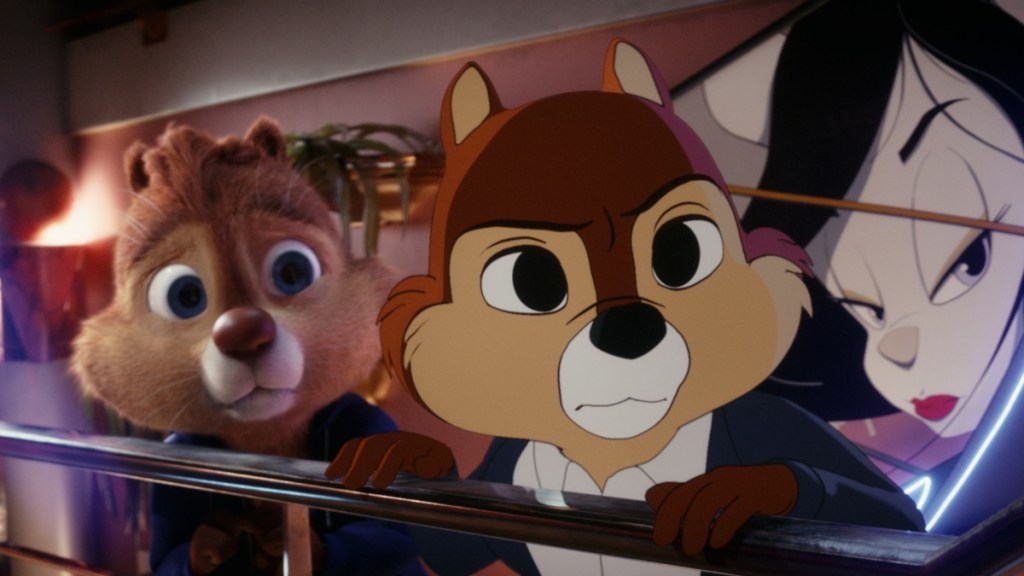
Chip ‘n Dale: Rescue Rangers (2022)
And now the latest contender. Ignoring Chip and Dale’s existence as classic Disney characters, we instead see the origins of Rescue Rangers as a TV show that two longtime friends got to star on before ego and bitterness got in the way. Acting as a modern follow-up to Who Framed Roger Rabbit?, we see that instead of a segregated society, humans and cartoons are now living side-by-side. More than that, we also get stop-motion clay people and puppets.
Chip ‘n Dale: Rescue Rangers goes all out with the guest characters. Having an Avengers mainstay would be expected, but instead we get Tigra. Tigra, who still hasn’t been in the MCU. Tigra, who was supposed to get her own animated series, but it got canceled mid-production. Tigra, who is representing the ill-fated Avengers: United They Stand cartoon that closed out the Marvel Animated Universe in the ‘90s. Then you get characters whose very inclusions are surprising on a meta level. We’re at a point where Butt-head and Randy Marsh are featured on Disney+. There’s even a Foghorn Leghorn Easter Egg thrown in there, going back to the glory days of Disney and Looney Tunes coexisting.
The movie has its high points (the cheesemonger sequence kills me), but it’s a very chaotic piece of work. Worth watching for sure, but it doesn’t hold together as well as something like Roger Rabbit. It does make a good follow-up to Space Jam: A New Legacy because Chip calling out the awfulness of making classic cartoon characters rap is the perfect response to that horrific Porky Pig battle rap sequence.
Best IP Crossover Moment: As a fan of Box Art Mega Man and Homsar, there’s something beautiful about Ugly Sonic getting his own spotlight for a couple scenes. He’s too weird to live and too rare to die, now existing as some kind of animated wild card. I can’t wait to see where he’ll pop up next, because Pandora’s box has officially been opened.
